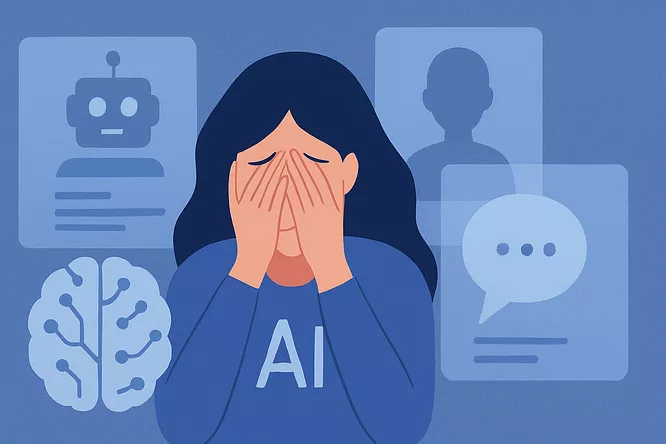What Is AI Fatigue—and Why Does It Matter?

Artificial Intelligence (AI) is everywhere. From the curated news on your phone, to the recommendations on your shopping site, to the “smart” assistant scheduling your day—AI is not just shaping our work, it is shaping how we think, focus, and feel.
For many, these tools feel like a lifeline: they save time, remove clutter, and simplify daily tasks. But beneath the promise of convenience lies a growing and less discussed risk—AI Fatigue.
Understanding AI Fatigue
AI Fatigue refers to the mental exhaustion, decision overload, and cognitive strain that arise from constant exposure to AI-generated prompts, feeds, and recommendations.
Unlike traditional digital burnout, AI Fatigue is unique in that it doesn’t just bombard us with content; it filters, predicts, and nudges us toward choices. Over time, this leads to a subtle but significant erosion of human autonomy and attention.
We are no longer merely scrolling through endless content; we are scrolling through machine-curated realities.
Why It Matters
-
Decision Fatigue
Every time AI offers a suggestion—what to watch, buy, read, or even say—we outsource a fragment of our thinking. While each choice feels small, together they add up to a state of decision fatigue where our ability to make deliberate, independent choices is diminished. -
Loss of Attention and Creativity
AI-driven feeds capture our focus in cycles of endless scrolling. Research shows that attention is a finite resource; once consumed by algorithmic engagement, it leaves less space for creativity, reflection, and deep thinking. -
Dependency and Psychological Risk
The more we rely on AI to filter our world, the harder it becomes to navigate without it. This dependency risks creating what some commentators are calling AI Psicosis—a state of mental detachment, anxiety, and passive consumption where critical thinking is replaced by algorithmic trust. -
Workplace Burnout
Ironically, the very AI tools designed to enhance productivity often create new forms of burnout. Constant notifications, auto-generated tasks, and machine-driven scheduling can overwhelm workers rather than empower them. Productivity, in this sense, comes at the cost of mental resilience.
Beyond Convenience: A Cultural Shift
AI Fatigue isn’t just a personal wellness issue—it is a cultural one.
When a whole generation grows up in environments where choices are constantly pre-filtered, the risk is not just tired individuals, but a passive society. Curiosity, exploration, and independent judgment risk being replaced by machine-curated habits.
If left unchecked, AI Fatigue could reshape how entire communities think, create, and make decisions.
What Can We Do?
At The Centre for Responsible Leadership, we believe technology must serve humanity—not exhaust it. Addressing AI Fatigue requires both personal practices and systemic responsibility:
-
AI Hygiene for Individuals
-
Limit exposure to endless feeds.
-
Use AI deliberately, not passively.
-
Schedule screen-free time to reclaim attention.
-
-
Ethical Design for Companies
-
Build AI systems with well-being in mind.
-
Prioritize transparency and user autonomy.
-
Design for balance, not addiction.
-
-
Collective Responsibility
-
Leaders must spark conversations on AI’s mental health impacts.
-
Policymakers must set standards for healthier digital environments.
-
Communities must normalize discussing AI fatigue just as openly as we discuss screen time or digital wellness.
-
Why Leadership Matters Now
AI is not only transforming industries—it is transforming minds. The leaders who recognize the risks of AI Fatigue today will shape a future where technology empowers without eroding the very capacities that make us human: focus, creativity, and critical thought.
This is not a call to reject AI. It is a call to use it wisely, design it responsibly, and integrate it consciously into our lives and workplaces.
Because when technology begins to shape not only how we work but also how we think, the question becomes urgent: Who is truly in control—us, or the machine?
✅ Call to Action: At the Centre for Responsible Leadership, we invite you to join this conversation. Share your own experiences of AI fatigue, and help us advocate for a future where AI supports human flourishing instead of undermining it.
👉 Sign the AI Open Letter: Principles for the Ethical Use of Artificial Intelligence here: https://www.thecrl.org/principles-for-the-ethical-use-of-artificial-intelligence